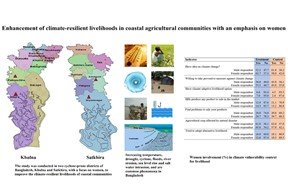Enhancement of climate-resilient livelihoods in coastal agricultural communities with an emphasis on women
Abstract
Climate change is causing widespread concerns along the coast, reducing agricultural productivity and destroying livelihoods. A study was conducted in two cyclone-prone districts of Bangladesh, Khulna and Satkhira, with a focus on women, to improve the climate-resilient livelihoods of coastal communities. Participatory rural appraisal techniques were used to collect community perceptions of climate change and variability, as well as adaptation options. A total of 699 participants were involved, where 466 respondents were in the treatment group mostly vulnerable to climate change, and 233 were in the control group similarly matched to the treatment groups. Female respondents were adequately involved in this research and accounted for 63% of the treatment and 60% of the control areas. Climate change was impulsive, according to the findings, and variability has increased over time with no optimistic outlook. The women had an idea about climate change, with 62.7% in the treatment group and 58% in the control group being aware of it. About 55.3% in treatment and 45% in control were willing to take preventative measures against climate change. Natural disasters and difficulty in selling their products impacted agricultural harvests, and as a result, both the treatment and control groups attempted to adapt to the alternative livelihoods in response to climate change. Respondents cited changes in rainfall patterns, cyclones, saline water intrusion, and other factors as causing lower yields and crop damage. To improve the adaptive capacities of their climate-resilient livelihoods, communities adapted to the changing environment by accepting high-yielding salt-tolerant varieties, introducing new technologies, and modifying livelihood options.
Keywords:
Adaptive capacity, Agricultural community, Alternative livelihood, Climate change, PerceptionDownloads
References
Abedin, M. A, Habiba, U., & Shaw, R. (2012). Health: Impacts of salinity, arsenic and drought in South-western Bangladesh. In Shaw, R. and Tran, P., (Eds.), Environment Disaster Linkages (Community, Environment and Disaster Risk management, Vol 9). Emerald Group Publishing Limited, Bingley, UK, pp.
-193, https://doi.org/ 10.1108/S2040-7262(2012)0000009016
Adeniyi, A. C., Grace, O. O., & Opeyemi, A. A. F. (2013). Climate change impact on female gender in Nigeria. Research Journal of Agricultural and Environment Management, 2(5), 115-120.
Adger, W. N., Hug, S., Brown, K., Conway, D., & Hume, M. (2003). Adaptation to Climate Change in Developing World. Progress in Development Studies, 3(3), 179-195.
Asia Foundation. (2012). A Situation Analysis of Climate Change Adaptation Initiatives in Bangladesh. Survey Report, Dhaka, Bangladesh, pp. 17.
Faisal, I., & Parveen, S. (2004). Food security in the face of climate change, population growth, and resource constraints: implications for Bangladesh. Environmental Management, 34(4), 487-498.
Hug, S., Hannah, R., & Laurel, A. M. (2006). Climate Change and Development Links. International Institute for Environment and Development (IIED), Gatekeeper Series 123, London, pp. 25.
Kabir, R., Khan Hafiz, T. A., Ball, E., & Caldwell, K. (2016). Climate Change Impact: The Experience of the Coastal Areas of Bangladesh Affected by Cyclones Sidr and Aila. Journal of Environmental and Public Health, ID 9654753, https://doi.org/10.1155/ 2016/9654753
MoEF. (2009). Bangladesh Climate Change Strategy and Action Plan 2009. Ministry of Environment and Forests, Government of the People’s Republic of Bangladesh. Dhaka, Bangladesh. pp. xvi+68.
Oxfam International. (2011). Owning Adaptation. Factsheet, Bangladesh, 1-5
Planning Commission. (2015). Agriculture Sector Development Strategy. Background Paper for Preparation of 7th Five Year Plan. Government of the People’s Republic of Bangladesh. Dhaka, Bangladesh, 257-303.
Rahman, M. M., Rahman, M., Hasan, M. M., & Islam, M. R. U. (2012). Livelihood status and the potential of alternative income generating activities of fishers’ community of Nijhum Dwip under Hatiya upazila of Noakhali district Bangladesh. Bangladesh Reasearch Publications Journal, 6 (4), 370-379.
Rashid, H., Afroz, S., Gaydon, D., Muttaleb, A., Poulton, P., Roth, C., et al. (2014). Climate Change Perception and Adaptation Options for Agriculture in Southern Khulna of Bangladesh. Applied Ecology and Environmental Sciences, 2(1), 25-31.
Roy, N. C., Haque, M. M.-Ul., Momi, M. A., Rahman, M. H., & Habib, A. Z. (2016). Livelihood status and socioeconomic condition of Hilsa fishers of lower Meghna river basin, bangladesh. Trends in Fisheries Research, 5(2), 8-13.
Shamsuddoha, M., Islam, M., Haque, M., Rahman, M., Roberts, E., Hasemann, A., et al. (2013). Local Perspective on Loss and Damage in the Context of Extreme Events: Insights from Cyclone-Affected Communities in Coastal Bangladesh. Dhaka, Bangladesh: Center for Participatory Research and Development (CPRD). Dhaka, Bangladesh, 1-28.
UNEP. (2014). The Adaptation Gap Report 2014. United Nations Environment Programme (UNEP), Nairobi, pp. 88. http://www.unep.org/climatechange/adaptation/gapreport 2014.
World Bank. (2010). World Development Report 2010: Development and Climate Change. The World Bank, Washington DC, pp. 444. https://openknowledge.worldbank.org/ handle/10986/4387 License: CC BY 3.0 IGO.
World Bank. (2016). Bangladesh:Building Resilience to Climate Change. Newsletter, IBRD, IDA, The World Bank.

Published
How to Cite
Issue
Section
Copyright (c) 2021 Agriculture and Environmental Science Academy

This work is licensed under a Creative Commons Attribution-NonCommercial 4.0 International License.

